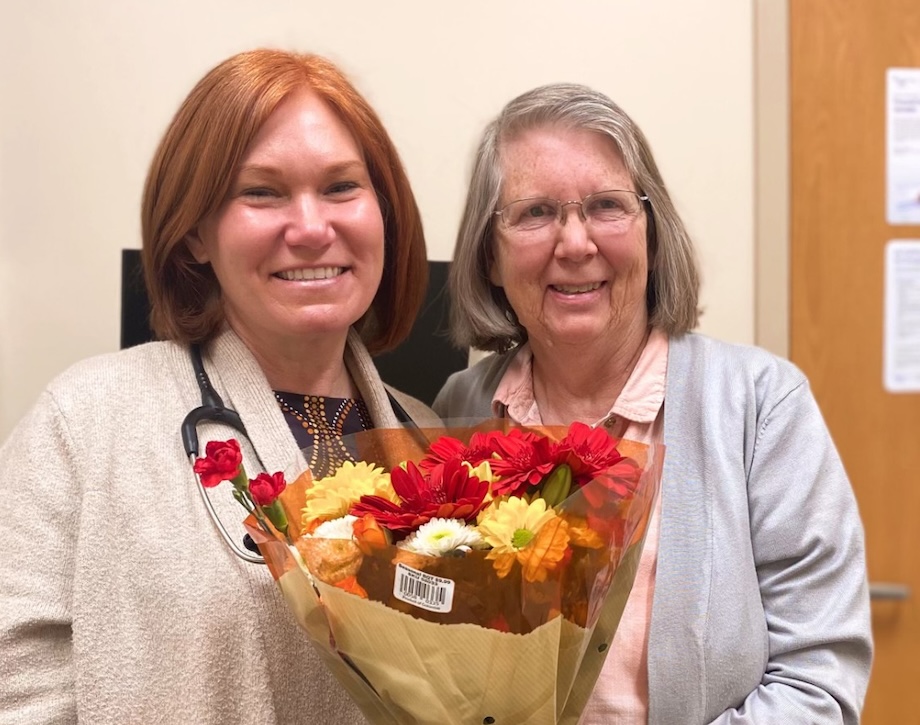It started with a persistent cough. It was fall of 2019, and Elizabeth Williams, 69, of Lexington didn’t think much about it. That was before COVID raised a new alarm against breathing difficulties. She has never been a smoker, so allergies seemed to be the most logical answer.
But the cough continued into 2020, and seemed to get worse. Her primary care doctor recommended that she should get a chest X-ray and CT scan.
“If I were a smoker, I would have jumped on it much sooner,” Williams said. “I thought it couldn’t be anything serious.”
In March 2020, after visiting with a pulmonologist, Williams was diagnosed with non-small cell lung cancer, stage 3. She was referred to Jessica Croley, MD, CHI Saint Joseph Health – Cancer Care Center on Blazer Parkway. After a period where time seemed to drag, things happened quickly, Williams said. That included a CT scan, PET Scan and MRI.
“I had a really large tumor in my right lung and Dr. Croley thought surgery would be the first step in treatment,” Williams said.
But it wasn’t resectable, Dr. Croley said. Dr. Croley worked with other specialists to develop a protocol to shrink the tumor to a point where it could be removed.
“We thought that was the end of it,” Williams said.
But in 2021, the cancer had returned in both lungs, meaning her cancer was now stage 4. Again, Dr. Croley joined forces with other specialists to develop a treatment protocol for Williams.
Dr. Croley said the type of lung cancer Williams had – EGFR-positive cancer – is more treatable than other types of lung cancer and is seen more commonly in women, non-smokers. EGFR, which stands for epidermal growth factor receptor, is a protein located on the surface of cells that helps them grow, according to the American Lung Association. A mutation in the gene that codes for the EGFR protein can make cells grow too much, which can cause cancer.
“We find actionable mutations in about 15 percent of lung cancer patients, and they allow us to use non-chemotherapy pill options for treatment”, Dr. Croley said. The cancer center tests for eight to 10 different gene mutations or alterations in newly diagnosed lung cancers to determine the optimal treatment plan.
“We don’t know a cause of those mutations or the other reasons people who are not smokers get lung cancers,” Dr. Croley said. Unlike breast cancer, where the BRCA gene and others can increase the risk of developing cancer, EGFR is not hereditary … the mutation is in the tumor itself, not in the genetics of the patient” she said. “It’s a mutation the cancer cells themselves harbor allowing unregulated growth,” she said.
After the treatment regimen, Williams is in remission, as she has been since the spring of 2022 when the tumor began to shrink and the nodules began to disappear. She has now stopped all therapy with no evidence of active cancer for the past year.
“When I finished training in 2013, we would tell patients with stage four lung cancer they have one year to live,” Dr. Croley said. “Now, 20 percent of patients are living five years or more. Lung cancer is not the death sentence it was 20 years ago and patients should not be fearful of getting tested and establishing a diagnosis because the earlier we detect it, the better the outcomes are.”
Smokers over age 50, who have smoked at least 20 pack-years, are at the highest risk for developing lung cancer, Dr. Croley recommends being proactive and getting screened for risk with a yearly CT scan. Nonsmokers, she said, should have an awareness of any new symptoms, such as a persistent cough that continues for several weeks. A health care provider can diagnose the root cause of the illness; bronchitis and emphysema have similar symptoms as lung cancer.
Williams called lung cancer a “quiet cancer.”
“There was no pain. It was the cough. Without the cough, I wouldn’t have thought anything about it.” In retrospect, she noted that she also lost 10-15 pounds; unexplained weight loss can be a sign that something is wrong.
Early detection of lung cancer means more treatment options and better survival rates. Learn more about lung cancer screenings at CHI Saint Joseph Health.
